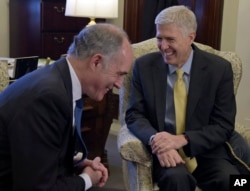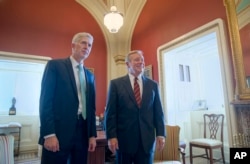In daily visits to Senate offices, Supreme Court nominee Neil Gorsuch has tried to make clear to Democrats that he's an independent thinker.
Gorsuch told senators that he found President Donald Trump's attacks on the judiciary “disheartening” and “demoralizing” after Trump had lashed out at a federal judge who issued a stay on his refugee and immigration ban. On Tuesday, Gorsuch told Democratic Sen. Dick Durbin that he hopes to be “half the nominee” as Merrick Garland, the judge nominated by President Barack Obama last year, only to be blocked by Senate Republicans.
Durbin, a Democrat from Illinois, also said Gorsuch indicated support for criminal justice reform — a Durbin priority — and disavowed a 2005 National Review article he'd written criticizing Democrats and liberals.
“He said it was probably one of the biggest mistakes he ever made,” Durbin recalled Thursday. “It's a terrible article. He wishes it would just disappear.''
Democratic senators uncomfortable with rulings
Though Democrats who have met with him have almost uniformly said that the perfectly pedigreed federal appeals court judge is impressive, Gorsuch's overtures may not be enough to win him an easy confirmation. Liberals are pressuring Democrats to strongly oppose Trump's pick. Several Democratic senators say they are uncomfortable with some of Gorsuch's judicial decisions.
A year after Justice Antonin Scalia's death created the vacancy, Democrats are still furious that Republicans refused to consider Garland. Senate Majority Leader Mitch McConnell, a Kentucky Republican, said voters should have a say in the choice via the presidential election.
Republicans would like to see Gorsuch take the ninth spot on the court by the time they leave for a two-week recess April 10 and in time for the court's arguments that start a week later.
Senate Judiciary Committee Chairman Chuck Grassley, a Republican from Iowa, said Thursday that the committee will hold at least three days of hearings starting March 20. That would give the Senate two weeks for committee approval and confirmation votes on the floor.
Needed: Eight Democrats
Senate Democratic leader Chuck Schumer said earlier this month that he has “serious, serious concerns” about Gorsuch, and Republicans will likely need the support of 60 of the Senate's 100 members to move to a confirmation vote on Gorsuch. Republicans have a 52-48 majority, so at least eight Democrats will need to vote with Republicans.
Much of the focus has been on 10 Democrats up for re-election next year in states that Trump won in the 2016 presidential election. While at least two — Ohio Sen. Sherrod Brown and Wisconsin Sen. Tammy Baldwin — have said they will oppose Gorsuch, many of the others have said little as conservative groups are already spending money to pressure them.
Montana Sen. Jon Tester spoke to reporters for less than a minute after his meeting with Gorsuch earlier this month, saying he is “open” to voting for the judge. Missouri Sen. Claire McCaskill won't comment at all on the nomination after she was criticized online for a tweet saying Gorsuch should get a hearing and a vote.
North Dakota Sen. Heidi Heitkamp issued a statement saying she discussed several local issues with the judge and “it is our job as U.S. senators to perform this function and not play politics.”
Connecticut's Murphy wary
Other Democrats have been more open with concerns. Connecticut Sen. Chris Murphy says he's wary of Gorsuch's sharp criticism of the Chevron doctrine, which holds that judges should defer to federal departments and agencies to fill in the blanks of certain laws, including on immigration and the environment.
The framers, Gorsuch wrote last year, intended for lawmakers to make the laws, executives to execute them and judges to decipher their meaning.
Murphy says Gorsuch's comments on Trump's tweets are irrelevant to his confirmation.
“It would be a story if he wasn't disheartened by the president of the United States openly attacking federal judges,” Murphy said.
Delaware Sen. Chris Coons said after his meeting that Gorsuch is an “engaging and well-educated person” but that he has concerns about some cases in which Gorsuch has written a dissent or concurrence on an issue that wasn't before the court, along with several of his decisions.
Hearings may be deciding factor
Democrats will likely seek to tie Gorsuch to chaos in Trump's White House and controversy over his immigrant ban, noting that some of his executive actions could end up before the court. When the judge was nominated, Virginia Sen. Tim Kaine said the actions of the Trump administration “raise the stakes to an even higher level.”
Asked whether he could see himself supporting Gorsuch, Durbin said, “Of course I'm not ruling that out,” but he says he awaits the hearings.
Senate Republicans have universally praised Gorsuch as they face questions about many of Trump's other decisions.
“He gives us an opportunity to talk about an issue that matters a lot to people across the country, and where we're very much in sync with what they want to see on the court,” said Sen. John Thune of South Dakota.






